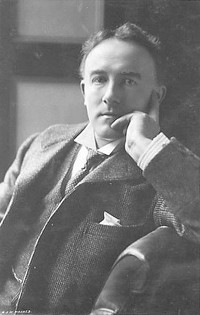Merrie England
Synopsis
Merrie England History

Merrie England is an English comic opera in two acts by Edward German to a libretto by Basil Hood. The patriotic story concerns love and rivalries at the court of Queen Elizabeth I, when a love letter sent by Sir Walter Raleigh to one of Queen Elizabeth’s Ladies in Waiting, Bessie Throckmorton, ends up in the hands of the queen. Its sunny depiction of England under “Good Queen Bess” has been criticized. The best-known songs from the opera are “O peaceful England”, “The Yeomen of England” and “Dan Cupid hath a Garden”.
It opened at the Savoy Theatre in London on 2 April 1902, under the management of William Greet, and ran for 120 performances, closing on 30 July 1902. The piece then toured while the Kitty Loftus Company played at the Savoy. The production reopened at the Savoy on 24 November 1902 for 56 additional performances, ending on 17 January 1903. It starred Henry Lytton, Louie Pounds, Rosina Brandram, Robert Evett and Walter Passmore, among other regulars of the Savoy.
The opera became popular in Britain and was often performed by amateur groups in the decades following its premiere. In Queen Elizabeth II’s coronation year, over five hundred amateur societies staged the piece. A 78 rpm recording of selections from the piece was made in 1931 on the Columbia label, with Clarence Raybould conducting “Under the Supervision” of the composer. Since then, a few more complete recordings have been made, including an HMV set in 1960, and individual songs from Merrie England have been recorded many times. Despite its lively and accessible music and libretto, the piece has fallen into relative obscurity in recent decades, although anniversaries such as that of the Armada in 1988 and the queen’s silver, golden and diamond jubilee years have seen many revivals. Opera South produced a revival in February 2012.
Source: Wikipedia
Merrie England Synopsis
Act 1
 During the May Day festival, the May Queen is crowned with “roses white and roses red … the flowers of Merrie England”. Her two guards are introduced – Long Tom and Big Ben – who are brothers identical in all but one thing. The “little difference between them” is that Big Ben (like the other men in Windsor) loves the May Queen, while Long Tom loves Jill (known as Jill-All-Alone). Jill is accused of being a witch by the jealous May Queen and is shunned by the townsfolk.
During the May Day festival, the May Queen is crowned with “roses white and roses red … the flowers of Merrie England”. Her two guards are introduced – Long Tom and Big Ben – who are brothers identical in all but one thing. The “little difference between them” is that Big Ben (like the other men in Windsor) loves the May Queen, while Long Tom loves Jill (known as Jill-All-Alone). Jill is accused of being a witch by the jealous May Queen and is shunned by the townsfolk.
Bessie Throckmorton, one of Queen Elizabeth’s Ladies in Waiting, and Sir Walter Raleigh are in love, but they must keep their love a secret as the queen is also in love with Raleigh. Bessie tells of how she carelessly lost a love letter from Raleigh (“She lost the letter from her love”). She worries that the letter may have fallen into Queen Elizabeth’s hands and thus reveal their secret love. The Earl of Essex (Raleigh’s rival for the affection of the Queen) is handed the love letter (an acrostic on the name Bessie) by Jill-All-Alone and plans to use it to dispose of Raleigh. Walter Wilkins, a travelling actor, appears and argues that any play can be vastly improved by the addition of song (“if it’s played on a big brass band”) and claims that “that’s where [he] and Shakespeare disagree.”
Queen Elizabeth enters with much ceremony. Long Tom pleads for the queen’s protection of Jill-All-Alone from the townsfolk’s persecution. The queen asks Jill whether she believes she is a witch. Jill replies with the paradox that if she were a witch, she would know more than the townfolk, therefore she can’t be a witch, as she would know (as the townsfolk seem to) that she is a witch if she were. She declares that love will pass the queen by. This insult angers the Queen, who joins with the villagers in condemning Jill as a witch, locking her away in the Tower of London for witchcraft. Essex hands the Queen Raleigh’s love letter, which she initially mistakes to be meant for her. Raleigh gallantly admits that the letter is in fact meant for Bessie Throckmorton. The Queen is so incensed that she banishes Raleigh from Court and imprisons Bessie in Windsor Castle.
Act 2
Jill has managed to escape with Bessie using a secret passage out of the tower. The Queen asks an apothecary (her jester in disguise) to concoct a poison which she will administer to Bessie.
Wilkins works at length on a stage version of the story of St. George and the Dragon, and the play is performed for the Queen and Essex. Unfortunately, they dislike the play.
Eventually the Queen is persuaded to allow Raleigh and Bessie to love each other freely, choosing Essex instead for herself after seeing an apparition of Herne the Hunter, who, according to legend, appears only when a sovereign contemplates a crime. The whole court takes part in a reenactment of Robin Hood’s wedding to Maid Marian. Everyone takes roles closely related to their part in the opera; for example, Raleigh becomes Robin to Bessie’s Marian.
Source: Wikipedia
